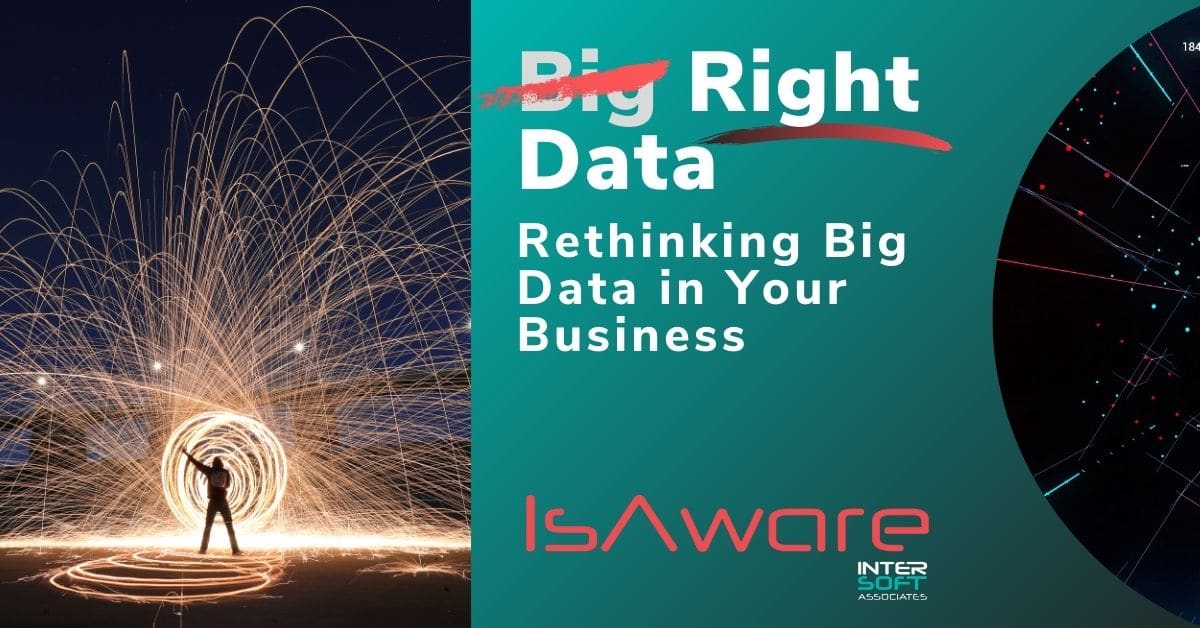Data is one of your most critical business assets. The increasing importance of Big Data in business operations makes it a crucial factor responsible for business expansion and success. The definition of Big Data is a collection of data that is large and complex, yet still grows exponentially with time.
Big Data can come in three varieties that can all be mined for meaningful and impactful information; structured, unstructured and semi-structured data. All forms of Big Data can be used in advanced analytics applications. Big Data can be characterized by its three V’s:
- The wide variety of data types usually stored in the organization’s Big Data system
- The high velocity at which the data is produced, gathered and processed
- The large volume of data present in various environments
How to Use Big Data?
The massive volume of Big Data is stored in a data lake. The data stored in the data lake can be left in its raw form and then organized for particular analytical uses. It can also be pre-processed using data preparation software and data mining tools so that it is ready and properly prepared for use in various applications.
The complexity and diversity of Big Data makes it useful in almost every industry to help organizations identify and categorize trends and patterns, tackle complex issues, gain insight into consumer preferences and answer questions.
Here are just a few examples of how different industries use Big Data:
- Finance Industry: The financial and insurance companies use Big Data systems and predictive analytics for real-time analysis of market data and risk management. They also use it for credit rankings, risk assessment, brokerage services and fraud detection.
- Agriculture: From predicting crop yields to engineering seeds, Big Data has transformed the entire agriculture sector. Leading scientists and researchers utilize Big Data to derive solutions for tackling malnutrition and hunger problems.
- Healthcare Industry: Big Data solutions are being used by researchers, hospitals and pharmaceutical companies to greatly improve their healthcare services. Big Data is used by pharmaceutical companies to engineer new vaccines and therapeutics much more quickly and efficiently.
- Energy Industry: Oil and gas companies in the energy sector use Big Data to monitor pipeline operations and identify potential drilling locations.
- Transportation companies and manufacturers use Big Data to optimize their delivery routes and effectively manage their supply chains.
- Other uses include smart city initiatives, crime prevention and emergency response systems.
Why Should Small Businesses Use Big Data?
Not long ago only a small fraction of information and data could be used by businesses for their analytics and operational applications. Rest data, referred to as dark data, was often processed and stored but never used. With the advent of new tools and technologies, businesses were able to invoke effective Big Data management practices to utilize their data assets successfully.
With proper Big Data management, businesses can now expand the capability of their data analytics strategies and improve their value. The leveraging of Big Data also helps create better opportunities for data mining, predictive analysis, machine learning, text mining and other advanced analytics disciplines. Using Big Data businesses can better understand customer behavior, detect fraudulent activities, identify operational problems, manage the supply chain and formulate appropriate solutions for recurring problems. When utilized well, Big Data can also help businesses design more effective advertising and marketing campaigns, reduce costs, increase revenue, improve business processes and create better strategic plans.
Benefits of Big Data
Big Data can do wonders for your business and create several new growth opportunities. Here are some practical ways Big Data can benefit your business and help achieve your organizational goals and objectives.
Better decision making
With the employment and deployment of Big Data management techniques, businesses and organizations will get the right tools to make smarter and more informed decisions based on accurate and timely information. But, this is only possible if the decision-makers have access to the right data needed to make these sensible decisions. This means the captured data should not be the responsibility of only business analysts and IT departments. Leaders across the company should inspect and investigate mined data before finalizing any decisions. By providing data across the company in a controlled way, businesses can prevent non-technical users from getting overwhelmed with the information and find answers to their queries conveniently. By including all of the appropriate members of the organization, they can also help to identify additional data points that are not currently captured and can allow leaders to continue to develop proper strategy.
Improved customer insight
Customers today increasingly prefer brands and businesses that understand their priorities and choices. Traditional customer feedback systems are being replaced by more advanced systems designed using Big Data technologies to help companies understand their customer’s behavior and provide more personalized and valuable services. The proper use of Big Data technologies help businesses identify the risks of a product or service at early stages and improve operational efficiency. With Big Data, companies can plan, read and evaluate customer responses more accurately and get meaningful insights into their buying behavior, trends and preferences. Additionally, the significant impact the use of data will have on operations and potential product improvement and cost savings help to positively impact EBITDA (earnings before interest, taxes, depreciation and amortization).
Delivering Better Products and Services
When businesses know more about their customers’ preferences and needs, they can design smarter products to suit their customers’ requirements. Big Data helps you realize how your customers perceive your product or service and helps you to adapt to match their expectations. With Big Data, you can test many options in a few seconds. With increased insight, you can easily iterate through additional scenarios to arrive at the best decisions possible. It helps you devise plans to provide better customer service and save time and money for your loyal consumers and stockholders. For instance, analyzing transactional data can help identify when a customer is paying twice for a financial service, like paying extra for travel insurance that is already covered in a bank account service. This way your business can make real-time recommendations to help the customers.
Improved Business Operations
The increasing automation and efficiency of various business functions and sectors is significantly due to the availability and use of Big Data technology. Whether in sales, manufacturing, marketing or human resources, Big Data has the potential to augment, improve and completely transform a wide range of business processes. Automation has made repetitive low-value tasks easier and frees skilled workers from time-consuming and tedious tasks, so they can put their efforts towards more higher value tasks like formulating strategic plans that add greater value to the business.
Recommendations for Effective Big Data Management
As a custom software development and consulting company, InterSoft has worked with companies at all stages of “Big Data maturity.” Some have no idea about how to gather and use the stored Big Data in order to research and find relevant and better solutions. Some simply do not have enough data to devise an action plan. We can help you understand and make more of the data you have and the data you don’t know you need to help have an actionable impact in your business.
Since Big Data involves a large amount of information, it is essential to manage it effectively so you can find the right data at the right time for your organization. Here are some tips to help you create a successful Big Data strategy:
- Clearly define your goals and objectives to make sure the Big Data strategy is aligned at all times.
- Categorize, prioritize and document any previous Big Data use cases that fulfill your business goals.
- Identify any available data sources and evaluate the current data usage practices followed in various organizational processes.
- Consider using cloud storage to potentially reduce costs and ease deployments.
- Manage Big Data sets using an iterative approach for different analytics applications.
- Collect and store data for possible future applications and uses.
- Design a project roadmap including a gap analysis of the business’s data architecture and current technologies.
We are here to help
Ultimately, the benefits of Big Data analytics depend on the efficiency and accuracy in processing and understanding it. InterSoft will help you identify which forms of Big Data analytics are suitable for your business and provide you with a roadmap to effectively using that data and the insights it provides. Whether making adjustments to processes, platforms or software your business already uses or designing a custom solution, InterSoft Associates is happy to help you explore the potential.






